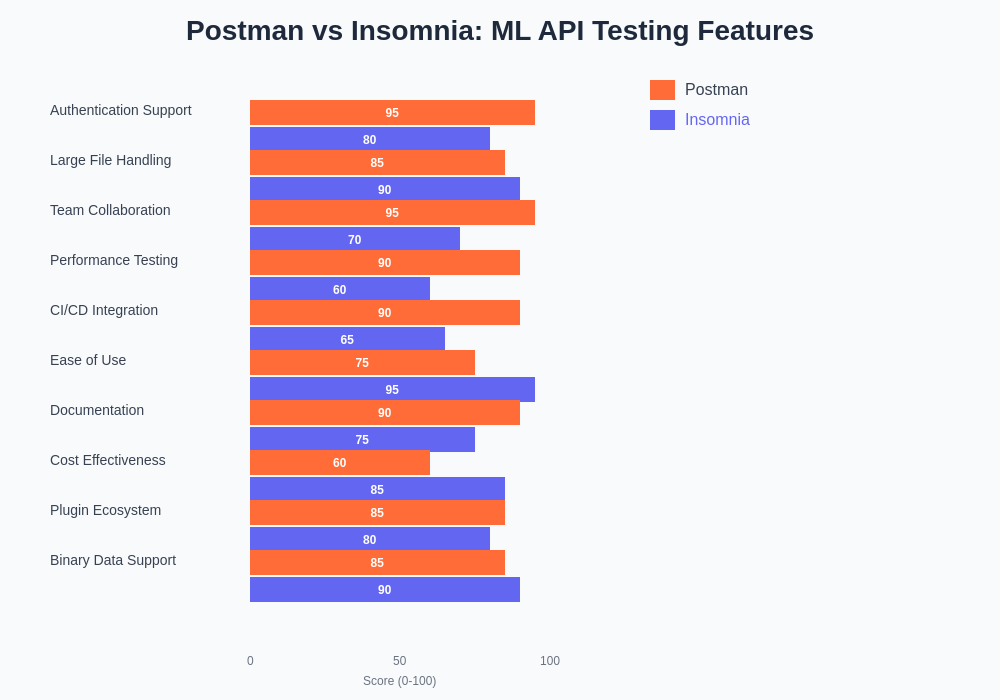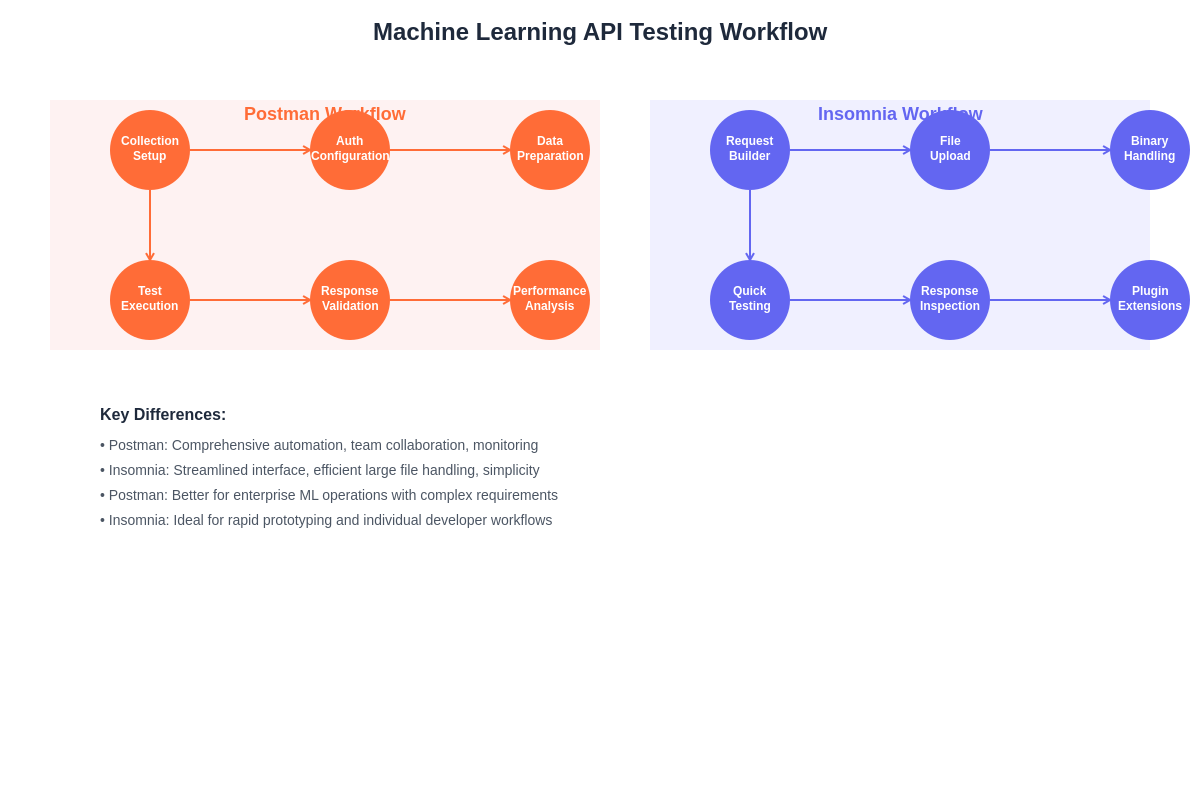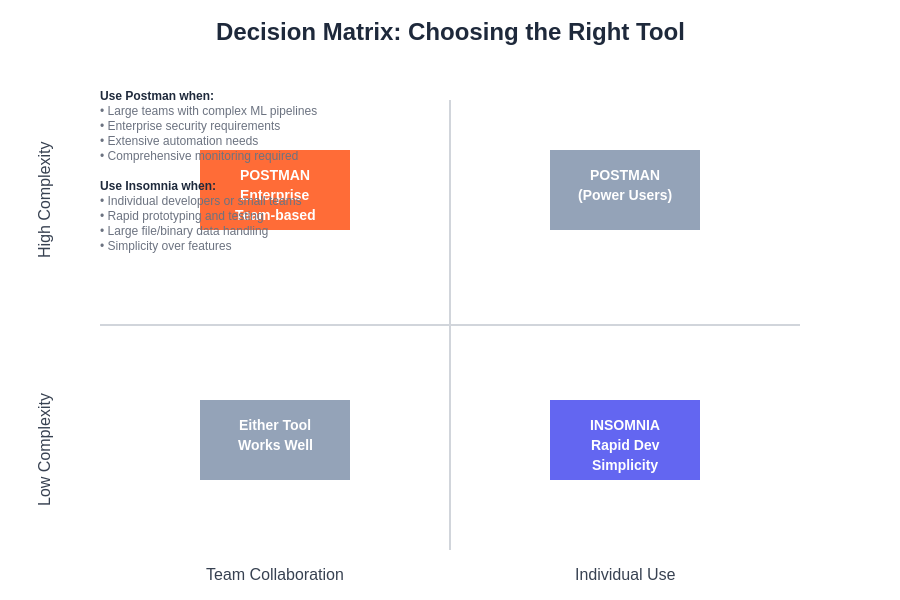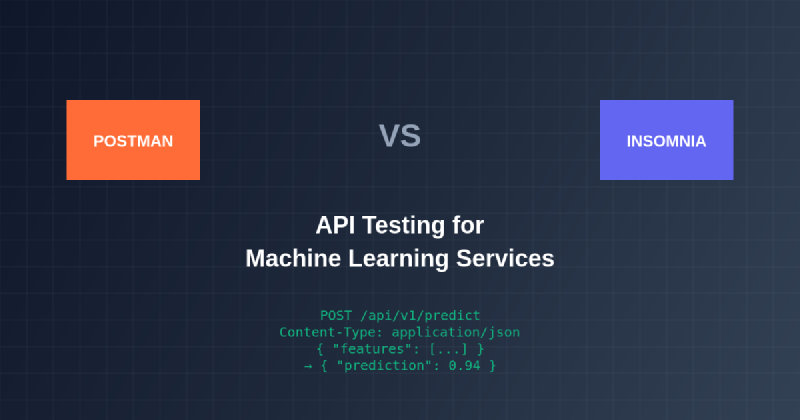Machine learning services have become the backbone of modern applications, from recommendation engines to computer vision systems, and the APIs that expose these services require rigorous testing to ensure reliability, performance, and accuracy. As machine learning models transition from research notebooks to production environments, developers and data scientists face the critical challenge of selecting the right API testing tools that can handle the unique complexities of ML services. Two prominent contenders in this space are Postman and Insomnia, each offering distinct advantages for testing machine learning APIs with their sophisticated request handling, authentication mechanisms, and response validation capabilities.
Explore the latest AI and ML trends to understand how API testing tools are evolving to meet the demands of increasingly complex machine learning architectures. The choice between Postman and Insomnia for ML API testing extends beyond basic functionality, encompassing considerations of workflow integration, team collaboration features, and specialized capabilities for handling large payloads, complex authentication schemes, and real-time model inference validation.
Understanding Machine Learning API Testing Requirements
Machine learning APIs present unique testing challenges that distinguish them from traditional web services, requiring specialized approaches to handle model inference requests, batch processing endpoints, training pipeline APIs, and real-time prediction services. Unlike conventional REST APIs that typically process structured data with predictable response formats, machine learning services often handle complex data types including images, audio files, video streams, and high-dimensional feature vectors that demand sophisticated testing methodologies and tools capable of managing large file uploads, streaming responses, and variable-length datasets.
The testing requirements for machine learning APIs encompass multiple dimensions including functional validation of model predictions, performance benchmarking under various load conditions, accuracy assessment across different input distributions, and reliability testing for edge cases and adversarial inputs. These requirements necessitate API testing tools that can efficiently handle binary data uploads, support custom authentication mechanisms for model access control, provide detailed response time analytics for latency-sensitive applications, and offer flexible assertion capabilities for validating complex JSON responses containing prediction results, confidence scores, and metadata.
Enhance your development workflow with Claude for intelligent assistance in designing comprehensive API testing strategies that account for the unique characteristics of machine learning services. The integration of AI-powered development tools with specialized API testing platforms creates a powerful synergy for ensuring robust and reliable machine learning service deployments.
Postman: The Industry Standard for API Development
Postman has established itself as the de facto standard for API development and testing, offering a comprehensive ecosystem that encompasses request building, automated testing, documentation generation, and team collaboration features specifically designed to streamline the API development lifecycle. For machine learning services, Postman provides robust capabilities for handling complex authentication workflows, managing environment variables for different model versions, and creating sophisticated test suites that validate both functional behavior and performance characteristics of ML endpoints.
The platform’s strength in machine learning API testing lies in its advanced scripting capabilities through JavaScript-based pre-request and post-response scripts, enabling developers to implement custom logic for data preprocessing, response validation, and dynamic test parameter generation. Postman’s collection runner feature proves particularly valuable for ML API testing by supporting batch execution of test scenarios across multiple datasets, automated regression testing of model updates, and performance benchmarking across different infrastructure configurations.
Postman’s enterprise features provide essential capabilities for large-scale machine learning operations, including role-based access control for sensitive model endpoints, version control integration for tracking API changes alongside model updates, and comprehensive monitoring dashboards that provide insights into API usage patterns, error rates, and performance trends across different machine learning services.
Insomnia: Streamlined Simplicity for Modern Development
Insomnia represents a more streamlined approach to API testing, focusing on simplicity, performance, and developer experience while maintaining the essential features required for comprehensive ML API validation. The tool’s clean, minimalist interface reduces cognitive overhead and allows developers to focus on the core aspects of API testing without being overwhelmed by extensive feature sets or complex configuration options, making it particularly appealing for teams that prioritize rapid iteration and straightforward testing workflows.
For machine learning API testing, Insomnia excels in handling large file uploads and binary data processing, crucial capabilities when working with image recognition APIs, natural language processing services, or audio analysis endpoints that require substantial data payloads. The platform’s efficient handling of streaming responses and real-time data makes it well-suited for testing machine learning services that provide continuous predictions, such as real-time recommendation engines or live video analysis systems.
Insomnia’s plugin architecture enables customization and extension of core functionality, allowing teams to develop specialized plugins for common machine learning testing scenarios such as image preprocessing, model output validation, or custom authentication schemes used by proprietary ML platforms. The tool’s GraphQL support proves valuable for teams working with modern machine learning platforms that expose their services through GraphQL APIs rather than traditional REST endpoints.

The feature landscape between Postman and Insomnia reveals distinct advantages for different aspects of machine learning API testing, with each tool excelling in specific areas that align with different team requirements and workflow preferences.
Authentication and Security Considerations
Machine learning APIs often implement sophisticated authentication mechanisms to protect valuable models and ensure appropriate access control, ranging from API keys and JWT tokens to OAuth 2.0 flows and custom authentication schemes that validate both user identity and usage quotas. Postman provides comprehensive authentication support with built-in templates for common authentication patterns, automated token refresh capabilities, and secure credential management through environment variables and vault integration, making it well-suited for complex enterprise ML deployments with multiple authentication layers.
The platform’s ability to chain authentication requests and dynamically update tokens proves essential when working with machine learning platforms that require multi-step authentication processes, such as obtaining temporary credentials for model access or refreshing tokens based on usage patterns. Postman’s pre-request scripts enable sophisticated authentication logic, including conditional token refresh, dynamic header generation based on request content, and integration with external identity providers commonly used in enterprise ML environments.
Insomnia offers solid authentication capabilities with support for standard authentication methods and the flexibility to implement custom authentication through its plugin system and request scripting features. While less comprehensive than Postman’s built-in authentication features, Insomnia’s approach provides sufficient functionality for most machine learning API testing scenarios while maintaining the tool’s characteristic simplicity and ease of use.
The security implications of API testing tools become particularly important when working with sensitive machine learning models or proprietary datasets, requiring careful consideration of credential storage, request logging, and data handling practices to ensure compliance with organizational security policies and regulatory requirements.
Performance Testing and Load Analysis
Performance testing represents a critical aspect of machine learning API validation, as model inference times, throughput capabilities, and resource utilization directly impact user experience and system scalability in production environments. Machine learning APIs often exhibit variable response times depending on input complexity, model size, and underlying infrastructure, necessitating comprehensive performance testing across different scenarios and load conditions to ensure reliable service delivery.
Postman’s performance testing capabilities extend beyond basic load testing to include sophisticated monitoring and analytics features that provide detailed insights into API behavior under various conditions. The platform’s ability to generate realistic load patterns, simulate concurrent users, and measure response times across different percentiles proves essential for validating machine learning services that must handle variable workloads and maintain consistent performance standards.
The tool’s integration with monitoring services and APM platforms enables comprehensive performance analysis that correlates API testing results with infrastructure metrics, providing a holistic view of system behavior under load. This integration proves particularly valuable for machine learning services where performance bottlenecks may occur at various layers of the stack, from model inference engines to data preprocessing pipelines and result formatting systems.
Insomnia’s performance testing capabilities, while more limited than Postman’s comprehensive suite, provide sufficient functionality for basic load testing and response time analysis. The tool’s efficient handling of concurrent requests and low resource overhead make it suitable for performance testing scenarios where the testing tool itself should not introduce significant overhead or resource contention.
Leverage Perplexity for comprehensive research on performance optimization strategies and industry benchmarks for machine learning API testing, ensuring your testing approach aligns with current best practices and emerging trends.
Handling Complex Data Types and Large Payloads
Machine learning APIs frequently process complex data types including images, audio files, video streams, and structured datasets that require specialized handling capabilities in API testing tools. The ability to efficiently upload large files, handle binary data, and manage streaming responses becomes crucial when testing computer vision APIs that process high-resolution images, natural language processing services that analyze lengthy documents, or recommendation systems that require comprehensive user behavior datasets.
Postman provides robust support for file uploads and binary data handling, with capabilities for managing large payloads, progress tracking for lengthy uploads, and efficient memory management to prevent client-side performance issues when working with substantial datasets. The platform’s ability to reference external files and dynamically generate request payloads proves valuable when testing machine learning APIs with diverse input requirements or when conducting systematic testing across large datasets.
The tool’s support for different content types and encoding schemes ensures compatibility with various machine learning platforms that may have specific requirements for data formatting, compression, or encoding. Postman’s pre-request scripts enable sophisticated data preprocessing, including image resizing, format conversion, or feature extraction that may be required before submitting data to machine learning endpoints.
Insomnia’s handling of large files and complex data types emphasizes efficiency and simplicity, providing streamlined interfaces for file uploads and binary data management without the extensive configuration options found in more comprehensive tools. This approach proves advantageous for teams that prioritize rapid testing workflows and straightforward data handling over extensive customization capabilities.
Collaborative Features and Team Workflows
Modern machine learning development involves diverse teams including data scientists, ML engineers, backend developers, and DevOps professionals, each with different perspectives on API testing requirements and workflow preferences. The collaborative features provided by API testing tools significantly impact team productivity, knowledge sharing, and consistency across different testing scenarios and team members.
Postman’s collaborative platform provides extensive team management capabilities including shared workspaces, collection sharing, role-based permissions, and integrated communication features that facilitate coordination across distributed teams working on machine learning projects. The platform’s ability to create and share comprehensive API documentation alongside test collections ensures that testing knowledge and best practices are preserved and accessible to all team members.
The tool’s version control integration enables sophisticated workflow management for teams that need to coordinate API testing alongside model development and deployment processes. The ability to track changes in API test collections alongside model versions provides valuable traceability and enables teams to maintain consistent testing standards across different development phases and deployment environments.
Insomnia’s team features, while more streamlined than Postman’s comprehensive collaboration platform, provide essential functionality for small to medium-sized teams that require basic sharing and synchronization capabilities without the overhead of extensive team management features. The tool’s focus on simplicity extends to its collaborative features, making it accessible to teams that prefer straightforward sharing mechanisms over complex permission systems.

The workflow integration capabilities of both tools reveal different approaches to supporting machine learning development processes, with implications for team productivity and testing consistency.
Integration with CI/CD and DevOps Pipelines
Continuous integration and deployment pipelines for machine learning services require sophisticated testing automation that validates both functional correctness and performance characteristics before promoting models to production environments. The integration capabilities of API testing tools with CI/CD systems, containerization platforms, and orchestration tools significantly impact the feasibility of implementing comprehensive automated testing for ML services.
Postman provides extensive CI/CD integration capabilities through its command-line interface, Docker containers, and API access that enable seamless incorporation of API testing into automated deployment pipelines. The platform’s ability to generate comprehensive test reports, export results in various formats, and integrate with popular CI/CD platforms makes it well-suited for enterprise machine learning operations that require sophisticated automated testing workflows.
The tool’s support for environment management and dynamic configuration enables flexible testing across different deployment environments, from development and staging to production systems with different model versions, infrastructure configurations, and performance characteristics. This flexibility proves essential for machine learning services that may have different behavior or performance profiles across different deployment contexts.
Insomnia’s CI/CD integration capabilities, while more limited than Postman’s comprehensive automation features, provide sufficient functionality for basic automated testing scenarios through command-line interfaces and scripting capabilities. The tool’s lightweight architecture makes it suitable for containerized testing environments where resource efficiency is a priority.
Cost Considerations and Licensing Models
The financial implications of API testing tool selection extend beyond initial licensing costs to include ongoing subscription fees, usage-based pricing for cloud features, and the hidden costs of training, customization, and maintenance across different team sizes and usage patterns. For organizations implementing comprehensive machine learning API testing strategies, these cost considerations significantly impact long-term tool viability and budget planning.
Postman’s pricing model includes both free and paid tiers, with advanced features such as team collaboration, monitoring, and enterprise security requiring paid subscriptions. The platform’s usage-based pricing for certain features may result in escalating costs for organizations with extensive API testing requirements or large development teams, making careful evaluation of feature requirements essential for accurate cost projection.
The tool’s comprehensive feature set may justify higher costs for organizations that require extensive collaboration features, advanced monitoring capabilities, and enterprise-grade security features, particularly in regulated industries or large-scale machine learning operations where comprehensive audit trails and access control are essential.
Insomnia offers a more straightforward pricing model with lower overall costs for most usage scenarios, making it attractive for small to medium-sized teams or organizations with budget constraints. The tool’s open-source foundation and plugin architecture provide opportunities for customization and feature extension without additional licensing costs, though this approach may require additional development resources.
Documentation and Learning Resources
The availability and quality of documentation, tutorials, and community resources significantly impact tool adoption, team onboarding, and long-term productivity, particularly for organizations transitioning to new API testing methodologies or expanding their machine learning testing capabilities. Both tools provide different approaches to documentation and educational support that align with their respective philosophies and target audiences.
Postman’s extensive documentation ecosystem includes comprehensive guides, video tutorials, community forums, and certification programs that support both beginner and advanced users. The platform’s focus on education and community building has resulted in a rich ecosystem of shared collections, best practices, and specialized resources for different API testing scenarios, including machine learning specific use cases.
The tool’s integration with educational institutions and training providers creates additional learning opportunities and ensures that team members can access formal training programs to maximize their proficiency with the platform’s extensive feature set.
Insomnia’s documentation approach emphasizes clarity and simplicity, providing straightforward guides and examples that align with the tool’s streamlined philosophy. While less comprehensive than Postman’s extensive resource library, Insomnia’s documentation covers essential use cases effectively and supports rapid onboarding for teams that prefer minimal complexity.
Making the Right Choice for Your ML API Testing Needs
The decision between Postman and Insomnia for machine learning API testing ultimately depends on specific organizational requirements, team characteristics, and project constraints that vary significantly across different contexts and use cases. Organizations with complex authentication requirements, extensive collaboration needs, and comprehensive monitoring requirements may find Postman’s feature-rich platform better aligned with their needs, despite higher costs and increased complexity.
Teams that prioritize simplicity, performance, and cost-effectiveness may find Insomnia’s streamlined approach more suitable for their machine learning API testing requirements, particularly when advanced collaboration features and enterprise integrations are not critical requirements. The tool’s efficient handling of large files and binary data makes it particularly well-suited for certain types of machine learning APIs that process multimedia content or require substantial data uploads.

The decision framework for selecting between these tools should consider both current requirements and future growth plans, as the scalability and extensibility of the chosen platform will impact long-term success and team productivity.
The evolving landscape of machine learning API testing will likely see continued innovation in both platforms as they adapt to emerging requirements such as model versioning, A/B testing for ML models, and integration with MLOps platforms. Organizations should consider not only current capabilities but also the development roadmaps and community engagement of both tools when making long-term decisions about API testing infrastructure.
Successful machine learning API testing ultimately requires a combination of appropriate tooling, comprehensive testing strategies, and team expertise that extends beyond the capabilities of any single platform. The choice between Postman and Insomnia should be viewed as one component of a broader testing strategy that encompasses functional validation, performance optimization, security assessment, and operational monitoring across the complete machine learning service lifecycle.
Disclaimer
This article is for informational purposes only and does not constitute professional advice. The comparisons and recommendations are based on current understanding of the tools and their capabilities as of the publication date. Readers should evaluate their specific requirements and conduct their own testing before making tool selection decisions. The effectiveness and suitability of either tool may vary depending on specific use cases, team requirements, and organizational constraints. Pricing and feature availability may change over time and should be verified with official sources before making purchasing decisions.
